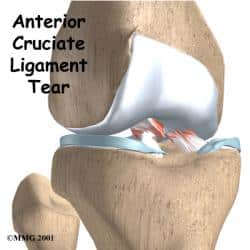Given the rapid increase in ACL injuries suffered by children and active adults, it is only natural to ask — What is the ACL?

The ACL is the Anterior Cruciate Ligament. A ligament in our body connects one bone to another in a very strong manner. Ligaments contribute to the stability of our joints. When the ACL is functioning our knees do not give out or feel weak. If we injure the ACL, then the knee might feel unstable or loose.
The ACL is one of four major ligaments in our knee. The ACL is the most commonly injured of the four. Over time, both adults and children have become more and more active, and more and more competitive. As an Orthopedist, I have seen a tremendous increase in the number of ACL injuries over the last decade. As such we are now spending more and more effort in trying to prevent ACL injuries from occurring. I would much prefer to be asked what is the ACL in a lecture series, rather then in the exam room after I have diagnosed you with an ACL tear.
Most ACL injuries occur from a non-contact twisting injury. Usually the athlete stops to pivot or turn and feels a pop, the knee gives way and they fall down. Following an ACL tear the knee will swell and you will usually be given crutches to walk on as you may find it difficult to walk on the leg for the first week or so.
Because the ACL plays such an important role in maintaining stability of the knee, you or your child should not run around or play sports after a serious injury until your knee has been evaluated to confirm whether or not an ACL tear exists.
During your appointment with your Orthopedist they will examine the injured knee and usually confirm that the knee feels loose. An MRI can be performed to confirm the diagnosis of a torn ACL. The MRI will also determine if you have injured any other structures within the knee. This will aid in determining what treatment might be necessary.
Now that you know what the ACL is, please see the following posts for more information on ACL tears…







